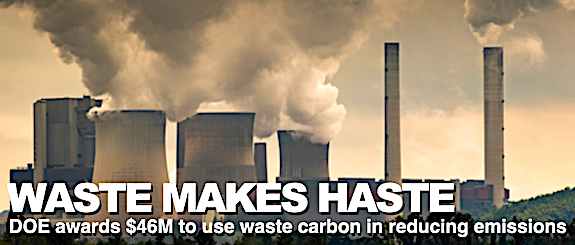Waste Makes Haste: DOE awards $46M to utilize waste carbon in reducing emissions

News arrived from Washington that the U.S. Department of Energy awarded $46 million for 22 projects to decarbonize the transportation and power generation sectors.
The projects will develop waste conversion and carbon capture technologies to produce fuels from biomass and waste streams, and enable algal systems to capture carbon and turn it into alternative clean energy sources.
These projects are funded by DOE’s Bioenergy Technologies Office under the Waste Feedstocks and Conversion R&D funding opportunity and BETO and Office of Fossil Energy and Carbon Management under the Carbon Utilization Technology: Improving Efficient Systems for Algae funding opportunity.
Science and infrastructure for utilizing waste streams
DOE awarded $29.5 million to 15 projects to improve the current science and infrastructure for utilizing waste streams, often disproportionately located in underserved communities, and support the development of improved organisms and inorganic catalysts for the production of valuable biofuels and bioproducts that can benefit the local energy economy. This effort will advance the Biden Administration’s goals to deliver an equitable, clean energy future, and put the United States on a path to achieve net-zero emissions, economy-wide, by no later than 2050.
The selected projects will:
- Research and develop valuable bioenergy resources: Awardees across 5 projects will look into the development of improved organisms and inorganic catalysts to support the next generation of low-carbon biofuels and bioproducts.
- Improve science and infrastructure for converting waste streams: Awardees across 10 projects will help enable waste feedstocks utilization and robust conversion processes to produce low-carbon biofuels that reduce emissions from hard-to-decarbonize sectors such as aviation. This effort is complementary to the Sustainable Aviation Fuel Grand Challenge, a government-wide effort which aims to achieve a zero-carbon aviation sector by 2050.
These projects fall into four topic areas for the “FY22 Waste Feedstocks and Conversion R&D” funding opportunity:
- Municipal Solid Waste Feedstock Technologies
- Robust Microbial Cells
- Robust Catalytic Processes
- Community Scale Resource and Energy Recovery from Organic Wastes
And the Winners are
Topic Area 1: Municipal Solid Waste Feedstock Technologies
- University of Kentucky (Lexington, KY)
- Worcester Polytechnic Institute (Worcester, MA)
- Gas Technology Institute (Des Plaines, IL)
- Michigan Technical University (Houghton, MI)
- Iowa State University (Ames, IA)
- North Carolina State University (Raleigh, NC)
Topic Area 2: Robust Microbial Cells
- Washington University in St. Louis (St. Louis, MO)
- Washington State University (Pullman, WA)
- The Ohio State University (Columbus, OH)
Topic Area 3: Robust Catalytic Processes
Topic Area 4: Community Scale Resource and Energy Recovery from Organic Wastes
- City of Gainesville (Gainesville, FL)
- Yolo County Division of Integrated Waste Management (Woodland, CA)
- Great Lakes Water Authority (Detroit, MI)
- Town of Yarmouth (Yarmouth, MA)
Technologies using waste carbon to reduce greenhouse gas emissions and produce reliable feedstocks and biotechnologies.
DOE awarded $16.5 million in federal funding.for projewcts that will:
- Increase the capability of algal systems to capture carbon dioxide and put it to productive use. Capturing this waste carbon then allows for algae to be cultivated into a variety of biofuels and bioproducts.
- Deploy algal technologies that will help lower algal system cost, while decreasing GHG emissions
The selected projects fall into two topic areas:
- Carbon utilization efficiency from biomass- or atmospheric-based sources of CO2
- Algae-based technology to utilize anthropogenic CO2 from utility and industrial sources
The carbon footprint of plastics alone, 2.2 billion tons of CO2 equivalent in 2015, shows the need for carbon neutral replacements.Algae can grow on waste CO2, functioning as a carbon sink. This algae biomass can then be used to create low or no-emissions biofuels and bioproducts which displace GHGs. Biofuels and bioproducts made from algae–such as plastics, foams, and chemicals–can be direct replacements for so many different everyday products from flip flops to water bottles.
And the Winners Are
Topic Area 1: Carbon utilization efficiency from biomass- or atmospheric-based sources of CO2
- Colorado School of Mines (Golden, CO)
- Colorado State University (Fort Collins, CO)
- Washington University in St. Louis (St. Louis, MO)
Topic Area 2: Algae-based technology to utilize anthropogenic CO2 from utility and industrial sources
Category: Top Stories















